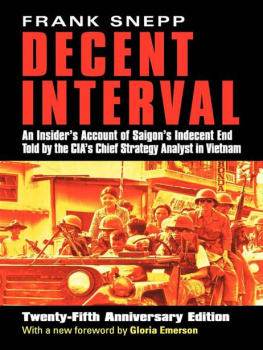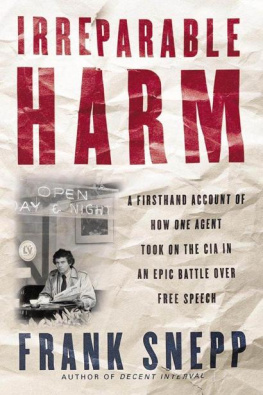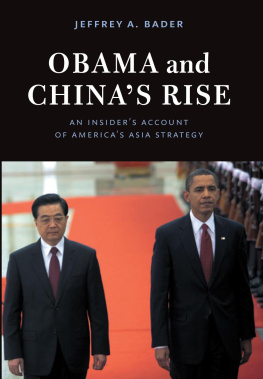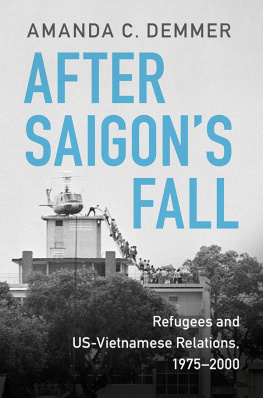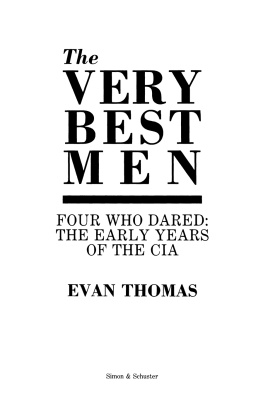Decent Interval
Decent Interval
An Insiders Account of Saigons Indecent End Told by the CIAs Chief Strategy Analyst in Vietnam
Twenty-Fifth Anniversary Edition
Frank Snepp
With a new foreword by Gloria Emerson

University Press of Kansas
1977, 2002 by Frank W. Snepp III
Foreword 2002 by the University Press of Kansas
First Edition published by Random House in 1977
Part-title drawings by Nancy Goodwin
All photos courtesy of the author unless otherwise noted.
All rights reserved
Published by the University Press of Kansas (Lawrence, Kansas 66045), which was organized by the Kansas Board of Regents and is operated and funded by Emporia State University, Fort Hays State University, Kansas State University, Pittsburg State University, the University of Kansas, and Wichita State University
Library of Congress Cataloging-in-Publication Data
Snepp, Frank
Decent Interval : an insiders account of Saigons indecent end / told by the CIAs Chief Strategy Analyst in Vietnam, Frank Snepp ; with a new foreword by Gloria Emerson.
p. cm.
Twenty-fifth anniversary edition.
Originally published: New York : Random House, 1977. With new foreword.
Includes index.
ISBN 978-0-7006-1213-0 (pbk : alk. paper)
ISBN 978-0-7006-2065-4 (ebook)
1. Vietnamese Conflict, 19611975United States. 2. Vietnamese Conflict, 19611975. 3. Vietnamese Conflict, 19611975Secret ServiceUnited States. 4. United States. Central Intelligence Agency. I. Title
DS558 .S58 2002
959.70438dc21
2002071374
British Library Cataloguing in Publication Data is available.
Printed in the United States of America
10 9 8 7 6 5 4 3 2 1
The paper used in this publication meets the minimum requirements of the American National Standard for Permanence of Paper for Printed Library Materials Z39.48-1984.
To Sep and Mai Ly
In Memory
Contents
MAPS
Foreword
The final days of the Vietnam War in April 1975 were a catastrophe, as the berserk American dream of our Vietnam ended, too. Here in these pages is the most complete account of what went so terribly wrong and why thousands of Vietnamese who had worked for the Americans were betrayed and left behind. It was the belief of the U.S. ambassador in Saigon, Graham Martin, that the one thing that could ignite a backlash against the Americans in Saigon was a sudden effort to evacuate. So he dithered. Cables to and from Washington flew back and forth. The ambassador, the CIA station chief, Thomas Polgar, and National Security adviser Henry Kissinger believed they had time to maneuver, with the Vietnamese in the north, and were slow to realize that this was futile. Indeed the ambassador was quite cavalier about plans to get all the deserving Vietnamese out, as if this were a minor detail.
Two weeks before Hanois troops took Saigon, and met no resistance, a young CIA man named Frank Snepp, chief strategy analyst in Vietnam, met with an agent, in disguise, who was one of the best in espionage. The Vietnamese spy gave Snepp the news he most feared: The North Vietnamese would fight until total victory and there would be no negotiations and no coalition governments. Polgar was not swayed and waved Snepp out of the way.
So at last we learned what went so horribly wrong, and why, in Snepps remarkable book, Decent Interval Even the most ardent critics of the war could not have ever imagined what Snepp the insider has revealed. The Americans in power, Martin and Polgar, were so committed to the idea of a negotiated way out that they could not accept what Snepp tried to tell them. Both men were blinded. Frightened and embittered, Snepp gave a briefing to American journalists on what lay ahead, in the hope that Washington would read these dispatches and act; but none of the American reporters filed on all that he revealed. A few even argued with him that they had better sources. So this is how it went.
The war in Vietnam was not mysterious, and the disgraceful end need not have happened as it did. The value of Snepps book is that it teaches us, in an absorbing and brilliant manner, where the mistakes were made in the CIA and in the highest ranks of officials. It is the only record I have ever read of how the Americans behaved at the eleventh hour. Some made heroic efforts to save Vietnamese colleagues, not all of which failed. Confusion spread through the evacuation program like a paralysis, Snepp writes.
So Decent Interval, with its uncommon details, gives us a picture of the huge U.S. mission in its death throes. Bob Loomis, the editor at Random House who worked in great secrecy with Snepp on his manuscript, says: It is a landmark. I think it really focused on the debacle in a way it never would have been. It poured salt in the wound, in a good way. Snepp, who served two tours in Vietnam, 19691971 and 19721975, was not only chief strategy analyst and a debriefer but also an interrogator of important prisoners, an ugly line of work. It was his choice to stay in Saigon until the bitter end. As April drew to a close, eighteen North Vietnamese divisions, backed by armor and artillery units, were closing in around Saigon. Snepp continued writing his intelligence analyses and looking for a glimmer of hope when there was none. Many of us will never forget the scenes on television and the photographs of Vietnamese trying to force their way through the gates of the U.S. Embassy in Saigon, begging and pleading and calling out their names, some waving pieces of paper as proof they had worked for the Americans.
Snepp was a loyalist who, like many other men, stayed at his post during the last frantic days. There was so much to be done. Americans were frantically incinerating the Embassy and the CIA files, which Martin had delayed because he feared the ashes would tip off the Vietnamese of the imminent pull-out. But they already knew. Once back home, Snepp resigned from the CIA when it became apparent that no serious investigation would ever be made of our shameful departure from Saigon and that any reports from him would not be welcome. The Agency did not intend to examine its faults. Snepp wrote his book so he could go on living as an honorable man and so that Americans would learn of the sickening mistakes that had been made, and of who had paid the price for these mistakes.
In the 1970s, when Snepp was writing this book, a wonderful friend of his in New York was typing and re-typing the pages in the apartment building next door to me on West 87th Street. One day he rang my doorbell and introduced himself. I was not happy to meet him since I feared the CIA and its brutal work and loathed its agents in Vietnam. But I thought Decent Interval was an important book that the country needed to read and to understand. The Justice Department sued Snepp when Decent Interval was published, at the urging of the CIA, on the grounds that he violated an unspoken agreement not to disclose what he had learned while working for the CIA. He was eventually ordered to pay punitive damages to the government. Snepp petitioned the Supreme Court to review a lower courts decision. It was a lesson in how government agencies, seeking revenge, can try to destroy an innocent man.
An account of his long, almost obliterating ordeal and of how he became the victim of unequal justice that violated legal precedents appears in his second book, Irreparable Harm, reprinted in 1999 by the University Press of Kansas.
But in those anxious days in New York, Snepp still had a fierce hope that the governments case against him would, as he put it, split at the seams. Friends felt concern for his safety. I was fearful that he would suddenly be hit by a sniper or killed in a hit-and-run since I knew how efficiently the CIA carried out assassinations in Vietnam. A friend advised me to tell Snepp to change his venue since the judge in Virginia presiding over his case was flagrantly biased. I did so.
Next page
